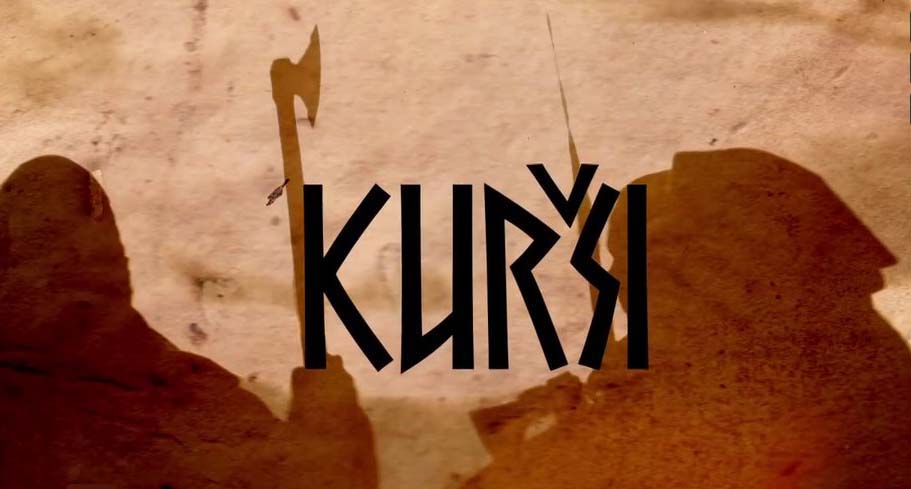A short movie about Baltic tribe Kurši/ Curonians with English subtitles. One of the pagan tribes, who formed Latvian nation, in early Middle Ages was known as fierce warriors and sea riders, kinda Baltic vikings.
Skyforger have song about them in album Kauja pie Saules, called Kurši.
Skyforger / History
Peter's blog about Latvian and Baltic history


nice 🙂
super stāsts par kuršiem. “ASINSKĀRI PAGĀNI”
Hello, I search for other people that search for authenticity in paganism and are ready to do something for it. I buyed a house here in Latvia, land of the holy pagan songs, and i try to establish here a self sufficient community to dive into the depths of Lativan culture to recuperate the real pagan religion that was lost somewhere here. If you are interested can live free here. Please contact me hubahuba@1email.eu
Thanks bye
Have also a blog in german 🙂 http://pagan-selbstversorgung.over-blog.com/
I am proud of being Curonian! Thank you for great reminder!
I can tell there’s some inaccuracies, like claiming that curronians were the only balts with sacred trees and sacred woods. Here in Lietuva, there’s quite a few( the most famous being ‘Sventaragis’ in Vinlius). Historical records also show that one of the reasons why lithuanians were so reluctant to accept Christianity was because the Christians wanted to cut down the sacred forests. (One account tells of women begging and crying in front of King Mindaugas, asking him to save the sacred forests).
But overall a good doc.
I don’t think they are claiming that only Curonians had sacred groves and trees, probably you misunderstood something, because every historian here knows that sacred trees and groves was all over the Baltic lands. There is written stories of how christian missionaries were killed in Old Prussia because they entered the sacred forests, where entrance was forbidden for people.
The whole world where afraid from the Vikings, but the Vikings were afraid of us!
proud to be one of the Balts/Aestians , greetings from lithuania!
I’m proud to be Curonian and happy to discuss any opportunities regarding this matter
Greetings from Sydney e mail:tech@liqmet.com
A newly discovered Curonian with my homelands lying along the Danga river outside of Memel. My family name is Dangelat (Danga – lat). Proud to be Curonian! Passing on all cultural information I can gather to my son. Anyone who has further information on the Curonians, their mythological beliefs, etc. I would be very grateful to make contact with you for my further education of this great ancient tribe!
I think there were some videos on youtube about Kurši/Curonians. We have great book here, written by Agris Dzenis, about Curonian
nobles/freemen, but it is only available in Latvian language. If you like, I can send on your email some Pdf files to read, not much in English though.
Hey everyone,
It’s 3:42 AM, and I find myself reflecting on a deep sense of loneliness and frustration. Over thousands of years, my people have endured cultural suppression and historical erasure. While learning history in school, I wasn’t fully aware of the extent of this, but as I grew older and researched more, I came to realize that the systematic erasure of Baltic identity has been ongoing for centuries. This realization became even clearer after immigrating to another part of Europe.
Despite technological progress and the accessibility of information, Baltic nations are still frequently misrepresented—often mislabeled as Russians. This isn’t just an oversight; it’s part of a long-standing historical pattern of assimilation and disregard for our unique identity. My father’s lineage traces back to the Klaipėda/Memel region, deeply connected to Courland for generations. Yet, while Vikings are celebrated worldwide, our own rich history remains buried and forgotten—despite the fact that Baltic tribes were well known to the Norse. The “Livonian Chronicle of Henry” (13th century) and other Viking sagas describe the Balts as both respected enemies and valuable allies. The Curonians, for example, were feared raiders who even launched their own attacks against Viking settlements, while at other times forming alliances with Norse rulers.
I understand that history is shaped by those in power, and smaller cultures have often been suppressed. However, what troubles me most is the internalized apathy among our own people. Many Lithuanians, despite having an ancient and distinct heritage, hesitate to embrace their Baltic identity. How did we reach a point where we distance ourselves from our own culture? How did we allow external influences to erode our language, traditions, and even our ancient pantheon of gods?
This isn’t just about past injustices—it’s about the survival of our identity. If we don’t actively preserve and reclaim our heritage, we risk losing it entirely.
For those who read through my rant, I’m just simply young pro-gamer living in my own world. If you want to connect and follow my journey please leave a follow on twitter/X